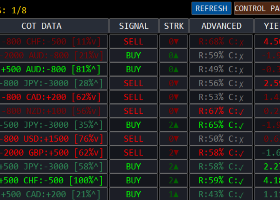The euro was sharply lower as Greece has set stage for a nervous week having failed to reach a deal with its lenders, taking it a step closer to a debt default that could force its exit from the euro zone.
The Swiss and Japanese currencies, both of which
often appreciate during times of uncertainty on their perceived
safe-haven status, were broadly higher, while the dollar notched a
three-week high against a basket of currencies.
EUR/USD was last 0.53% lower trading at 1.1104.
EUR/CHF was last at 1.034100.
EUR/JPY was last at 135.380005.
USD/JPY plunged 0.90% to 122.74, while USD/CHF was at 0.9342 climbing 0.13%.
As Reuters reports, Europe's shares were expected to bear the brunt of the Greek crisis, with Germany's Dax seen falling up to 3.8 percent, France's CAC 40 3.6 percent and Britain's FTSE 2.9 percent.
Greek Prime Minister Alexis Tsipras shocked European officials by instead calling for a referendum to be held on July 5 to ask Greek voters to decide whether to accept the bailout terms which his government opposes. Athens also closed banks and imposed capital controls to prevent a collapse of its banks as anxious investors pulled out their cash.
The possibility of a Greek default on a 1.6 billion-euro payment to the International Monetary Fund by a Tuesday deadline appeared greater after Athens effectively rejected proposals made by its European lenders in exchange for more credit at last-minute bailout talks at the weekend.
Greece's banks and stock exchange are expected to stay closed during the coming week following as recommended by the country's Financial Stability Council late Sunday, according to reports.
This happened few hours after the European Central Bank blocked Emergency Liquidity Assistance (ELA) support to the country's lenders at levels agreed on June 26 - a figure estimated to be around €90 billion.
In the wake of the busy weekend and before the nervous week, MarketWatch has compiled the timeline of what has brought the Greek crisis to where it is now:
- Tsipras made the shocking decision Saturday to hold a Greek referendum (mainly centered on the terms Greece would need to agree to in order to be granted some €15.3 billion in funds) set for July 5, five days after the country’s payment to creditors is due.
- Eurozone finance ministers on Saturday turned down a request for an extension of the Tuesday payment to the IMF.
- On Sunday, the European Central Bank capped the level of much-needed emergency funding for Greece’s banking system.
- Greece announces that it will impose capital controls Monday, possibly continuing until the July 5 referendum, according to reports. Greece’s stock market also will be closed. A so-called bank holiday, meant to prevent bank runs, will begin Monday and will reportedly last for six days.
- Lines had formed at Greek banks as citizens sought to pull their money after Tsipras announced the decision to hold the referendum.
What to expect Monday:
- Volatility: Officials have been arguing that investors are prepared for a Greek exit, or “Grexit,” from out of the shared currency bloc, but uncertainty and thin volumes due the holiday week may see choppy trading action in European markets, as well as for the euro , and safe-haven assets such as German bunds and gold, as investors stage a flight to safety amid the uncertainty.
- Specifically, the euro may prove a major focus for trading bets as a healthier U.S. economy and shaky unity within Europe’s currency bloc creates a perception of divergence between the two regions.
- As Citigroup wrote in a research note Sunday, “uncertainty about the outcome of the referendum on Sunday [July 5] will likely increase the desire of the holders of the remaining €130 billion in deposits (held by the private non-financial sector) in Greek banks to take their money out — abroad or ‘under the mattress’. Tighter enforcement of the capital controls, deposit-withdrawal controls and other external-payment controls will become likely.”
- Markets also are likely to hear words of support from ECB President Mario Draghi, who will likely stress the strength of the union and underscore that any issues with Greece would be contained. He may also point to the ECB’s ability to provide any additional assistance necessary to mitigate spillover into other regions in the event of a Greek default or Grexit.
- Morgan Stanley on Sunday lifted its probability of a Grexit in 12 to 18 months to 60% from 45% previously.
- German Chancellor Angela Merkel has been unusually quiet over the weekend, though she might be more vocal in the coming days. Merkel spoke to U.S. President Obama about the critical importance of Greece remaining a part of the eurozone.



